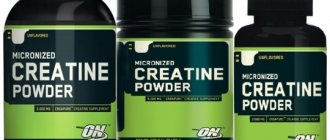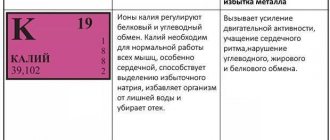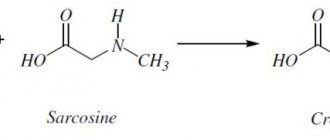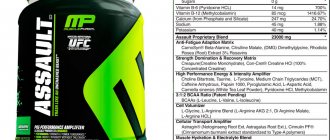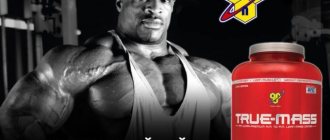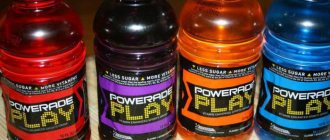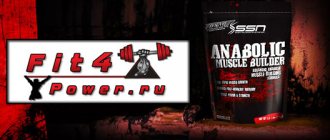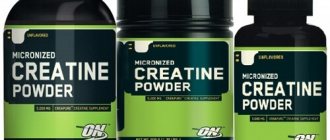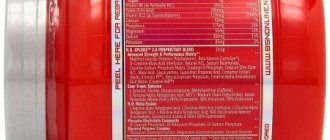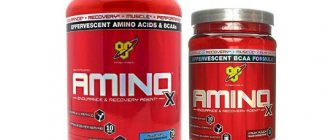CON-CRET[edit | edit code]
CON-CRET from ProMera Sports
CON-CRET
is a sports supplement from ProMera Sports that contains purified creatine hydrochloride (a new form patented in 2009). Currently it occupies a leading position in the ratings, but its effectiveness remains in doubt.
Manufacturer's description[edit | edit code]
CON-CRET is the world's first and only pure creatine hydrochloride that provides safe and effective results without the side effects associated with other forms of creatine (eg bloating, cramping, stomach irritation, water retention, etc.). With its unique Micro-Dosing® technology, it is the only creatine that is dosed based on weight - 1 teaspoon (1 scoop or 1 capsule) per 100 lbs.
CON-CRET is a concentrated creatine hydrochloride powder that has been proven to be the most potent and soluble creatine on the sports nutrition market. Creatine varies in effectiveness depending on its solubility, since if it is in an undissolved form, it will not be absorbed into the blood. The results of a study conducted by scientists from two major universities showed improved absorption and increased plasma concentrations of CON-CRET - up to 70% more than monohydrate and other forms of creatine.
CON-CRET is the most easily absorbed form of creatine, more accessible and therefore does not require much loading or shutdown. CON-CRET Creatine provides significant gains in performance, endurance and muscle recovery and is safe to take every day. Available in powder and capsule forms, each serving of CON-CRET creatine is equivalent to 5-10 grams of monohydrate.
In order to evaluate effectiveness, solubility must be taken into account, since creatine must be dissolved before it can enter the bloodstream and cells for maximum performance to be achieved. A study conducted by Vireo Systems (a large research company) and major universities showed that CON-CRET's solubility, bioavailability and effectiveness are much higher compared to creatine monohydrate.
Thus, the results showed that creatine hydrochloride dissolves in water much better (88 g in 100 ml), while the solubility of monohydrate is only 1.5 g in the same volume. This means that our product is 59 times more powerful!
Since the human body is primarily composed of water, these results demonstrate differences in the bioavailability of different forms of creatine. Health professionals and the medical community would agree that solubility is one of the key mechanisms of action that ensures the absorption of molecules in the body.
Application in sports nutrition
The Con-Cret supplement is produced by ProMeraSports. Now this dietary supplement retains its position as the sales leader in the creatine hydrochloride market. It is believed that this chemical type of substance has the greatest solubility, which means maximum digestibility and effect on the body.
The powder is used to increase energy reserves during intense physical activity. This effect prevents the launch of catabolic reactions and accelerates the growth of muscle fibers.
The compound neutralizes the formed acids during active cellular metabolism, which lower the pH of the blood. A shift in acid-base balance causes muscle fatigue.
The effect of creatine eliminates discomfort and increases endurance.
The supplement is used by athletes for more efficient absorption of glucose.
Expert reviews[edit | edit code]
We begin our assessment by quoting a 2011 article by Ben Esgro, BS:
“To date, there are no published controlled studies of creatine hydrochloride and no data to support any of the manufacturer's claims.”
Currently the situation has not changed. Doubts remain and are increasing. We tried to collect available facts that allow us to evaluate Con-cret objectively. In the pharmaceutical industry, hydrochloride is very often added to the active substance to increase its solubility and, as a result, bioavailability. However, a positive effect is not always achieved. [1]
This fact raises the question, why, after so many years of experimental work on creating a new form of creatine, no one thought of testing creatine hydrochloride, given that this salt is often used for these purposes?
Mark Faulkner, the inventor of this form, writes:
We have finally studied this molecule after first synthesizing it in 2003.
This happened by chance while we were working on creating creatine ethyl ester hydrochloride. We made a batch of creatine hydrochloride by mistake. Question: why on earth did you have to wait 6 years before starting work on a more promising form?
An open thread on the BB.com forum also reveals that Mark Faulkner was involved in the development of the well-known creatine ethyl ester.[2]
Let us recall the history of the esterified form, which very much resembles, or rather completely repeats, what is now happening with creatine hydrochloride:
- A new form has been synthesized
- A beautiful scientific rationale is given and one study that has not been published anywhere
- A wide advertising campaign has been launched
- Popularity increases sharply, numerous positive reviews and high ratings
- Disconfirming studies come out and history comes to an end
Looking at creatine hydrochloride, we have:
- A new form has been synthesized (in the best traditions of pharmacological science fiction, “by mistake,” which undoubtedly makes creatine hydrochloride stand out from the general series)
- The rationale for effectiveness is practically impeccable, but there is only one study and has not been published anywhere
- A lot of noise and active publication (many magazines quickly placed Con-cret in the top and published laudatory articles). The most famous of them: POWER Magazine, Muscle & Fitness, Planet Muscle, Powerlifting USA and many others.
- As a result, ratings increased, in some places naturally, but in others perhaps not. The placebo effect and mass opinion work flawlessly, as proven by the experience of Creatine Ethyl Ester. People still believe that this form is better than the monohydrate.
- ???
There are also many doubts regarding solubility: if the stomach, as a rule, always contains about 1 liter of liquid, then the monohydrate will be easily soluble in a dose of 10 g, why 59 times more? This will not affect the speed of absorption. Similar doubts are expressed in many foreign forums. For your information, we offer a topic with official answers from the inventor, Mark Faulkner (last messages from April 2012): https://www.ironmagazineforums.com/supplements/111826-creatine-hydrochloride-vs-monohydrate.html
Conclusion
We cannot accurately answer the question about the effectiveness of creatine hydrochloride, since there are currently no results from independent studies. However, in all other respects there are clear similarities with the esterified form: the same inventor, the same marketing strategy, the same incredible benefits. Given that the previous campaign was an excellent success, why not do it again? Taking into account the above facts, the superiority of the supplement is still in great doubt.
By the way, it is worth noting that creatine hydrochloride began to be actively produced in China. 1 kg of product costs only 240 rubles. with a purity of 99%.[3]
Recommendation for adherents[edit | edit code]
I would also like to add that Con-cret research was carried out by Vireo System, which is known for another development - StayActiv. This supplement is a mixture of amino acids. It is used as a pain reliever with an “incredibly powerful” and “absolutely proven” effect. The composition contains only a mixture of several amino acids. No pharmacologist in his right mind would believe in its effectiveness. But if you are confident in Con-cret, then you will undoubtedly like StyayActiv. With its help, you can eliminate even severe pain by simply rubbing amino acids into the right place. Reviews from practitioners: Dear, you can talk about the effectiveness of creatine hydrochloride here as much as you like, but it’s better to see once than to hear a hundred times, isn’t it? I’ve personally tried hydrochloride more than once and I absolutely don’t care about the opinions of local experts - I’m absolutely confident in positive effect, and specifically in increasing strength endurance when using hydrochloride! There is not much of this undervalued product on our market. I would suggest writing reviews here from trainees, but only with a decent amount of training experience and preferably “pure” athletes (like me)) then I mean, without AS. I haven’t heard phenomenal reviews about it, or any other sports nutrition, but it’s the hydrochloride that really raises you one or two steps in your strength training! I specifically haven’t been drinking creatine for a month, but in 5 days they will bring me creatine hydrochloride, which, unlike monohydrate (also a very effective product, by the way), does not require more than a week to start working, and everything is felt literally in two or three days. In general, I’m tired of writing, only from training... by the way, my experience is almost 15 years, mainly in amateur powerlifting.
Differences from other forms of creatine
Let's start with the prefix hydrochloride. Perhaps some people know from a school chemistry course that hydrochlorides are highly water-soluble crystalline compounds. In the pharmaceutical industry, hydrochlorides are used to attach to the active substance, improving its storage stability and solubility in liquids. When you go to any pharmacy, you can see that many different medications are available in the form of hydrochloride. This is done for a reason, this form helps the active substance to be absorbed much better, and this rule also applies to creatine hydrochloride.
Loading method of use
We recommend following certain rules for taking the supplement.
- Loading time is one week and three days. (10 days).
- The first week you will have to control the dose, since it is correct to take creatine at the rate of 0.25-0.30 g per 1 kg of body weight. Which, translated into normal language, means the daily requirement is 20 g for an 80-kilogram athlete.
- This mass should be divided into 4 teaspoons per day.
- The first dose is after waking up on an empty stomach, and the rest during the day.
- On days when training takes place, creatine should be taken immediately after exercise, because it is at this moment that the body needs immediate resuscitation.
- During this (loading) period, the concentration of the drug in the athlete’s body is highest. This may be enough for training before the start of competitions, tournaments and a new, difficult training program.
- If there is still a need to maintain the level of the substance in the body, then do not stop taking it, but reduce the dose. To calculate the maintenance dose of the drug, simply multiply your body weight by 0.03. For example 100 kg. the athlete takes 3 g.
- Take a 2-4 week break. At this time, the content of the substance returns to its original norm.
- There is an opinion that with normal consumption of natural creatine with food (meat, fish, animal products), the second maintenance period should be excluded. In this case, the active loading period can be repeated every few months.
Biological role of the drug
Creatine molecules help create energy reserves in the body, which allows athletes to lift more weight in strength exercises and increase strength. The muscle enlargement effect is observed due to the additional attraction of nutrients and water to the structural muscle fibers.
Note! Also, taking the supplement can increase the natural level of testosterone in the male body (by about 20-25% within 10 weeks after starting use). This mechanism has a positive effect on strength indicators and the rate of muscle mass gain.
